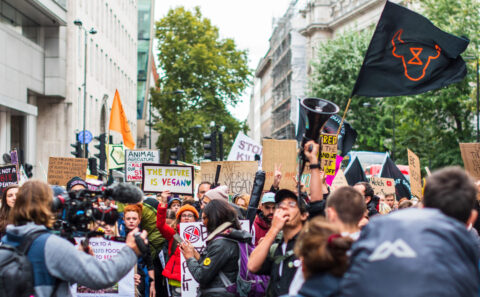Solutions
Overfishing Threatens More Than Ocean Life. It’s Also Fueling Emissions.
Climate•6 min read
Reported
In a year of unprecedented social and environmental upheaval, activist groups are scrambling to predict how the pandemic will play out.


Words by Billie Savage
 This story is a part of Covering Climate Now’s week of coverage focused on Climate Solutions, to mark the 50th anniversary of Earth Day. Covering Climate Now is a global journalism collaboration committed to strengthening coverage of the climate story.
This story is a part of Covering Climate Now’s week of coverage focused on Climate Solutions, to mark the 50th anniversary of Earth Day. Covering Climate Now is a global journalism collaboration committed to strengthening coverage of the climate story.Three weeks into the Netherlands’ so-called “intelligent lockdown,” a small group of climate activists, dressed in business attire, left their homes to stand guard at the entrances to a conference hall in Amsterdam, Netherlands. Inside, Ahold Delhaize shareholders gathered for their annual meeting. In a joint campaign to end deforestation in the Amazon, activists from two climate groups—Animal Rebellion Netherlands and Mighty Earth—called on shareholders to pressure Ahold to cut ties with agribusiness giant Cargill.
Today, as the world grinds to a halt under COVID-19 lockdowns and news of the novel coronavirus dominates the headlines, the climate emergency rages on.
In 2019, deforestation in the Amazon hit a new high—an 85 percent increase from a year ago—and is on track to climb even higher in 2020. In the U.S., the Environmental Protection Agency suspended its enforcement of environmental laws in response to the coronavirus outbreak. In Australia the government quietly announced changes to their environmental protection laws, essentially absolving mining companies of any legal consequences of wildlife habitat destruction. In the Netherlands, as the lockdown unfolded, the cabinet voted to postpone a package of climate measures due on April 1st.
“We are now busy with other things,” said the Netherlands climate policy minister Eric Wiebes.
But the abuse and slaughter of the trillions of animals caught in the global farming and fishing industries rumble on without pause. As the planet approaches an ecological tipping point, climate activists say they are becoming more attuned to the impact COVID-19 has on their activism—and more conflicted about how and when to respond.
Dan Kidby, strategist at Animal Rebellion, an activist group calling attention to animal agriculture’s role in the climate crisis, says it’s important for organizations to consider the timing of their message, especially during a pandemic.
“If you go and try to organize a mass gathering now then you’re just going to be torn apart,” he said. “People are going to think you’re totally irresponsible because everyone’s scared about this virus and doesn’t want it to spread.”
In the Netherlands, civilian groups of more than three are banned. But in an ironic mirroring of the global state of play, the Ahold corporate shareholders met in-person, while public officials are denying permits to protest groups under COVID-19 regulations. So activists are being forced to improvise—wearing surgical gloves, traveling in groups of two, maintaining a wide distance from each other—and accompanied by police on an otherwise empty street.
“Everything is cancelled and our lives are on hold here, but it’s business as usual for Ahold Delhaize, so why should we stay silent?” said Caroline Bech, an activist with Animal Rebellion Netherlands.
As the full implications of the novel coronavirus continue to hit the West, a gradual realisation is dawning among environmental and animal justice groups that they would not be able to continue their work. In the current climate of fear, any activism not executed at home from behind a screen faces 360 degrees of criticism—even from other activists.
Shivonne Kaspara Engen of Activism on the Road was in the middle of a Save Movement tour of Europe when news of the outbreak broke. On March 15th, she decided to organise one last street action in Berlin before full restrictions took effect, highlighting the link between animal exploitation and zoonotic disease.
“On that Sunday, there were no regulations other than we shouldn’t be in groups of more than 50 people,” said Engen, who wore a hazmat suit to the protest and kept her distance from others. “There were people everywhere. We refused to be the first ones to leave the streets. Animals are still dying.”
Engen believes this is a crucial time for activists to improve on their effectiveness. “In the last few years there’s been much talk about strategy and tactics, but nobody ever had the time to sit down and really work out these things,” she said. “We should spend all that time we have off now to do the research and find new ways to be active.”
On the same weekend of the Berlin action, Extinction Rebellion and Animal Rebellion, climate action groups that largely rely on mass gatherings and civil disobedience to achieve social change, issued statements cancelling their Spring Rebellion and retreated into a period of regeneration.
Extinction Rebellion’s official statement in response to COVID-19 read: “At a time when the coronavirus is disrupting business as usual, grounding flights and halting industry, let’s disrupt in a different way. Let’s disrupt the hyper-individualistic society in which we live. Let’s take this time to slow down, safely connect with family and friends, and remember all we have to be grateful for.”
Kidby echoes this sentiment. “COVID-19 has changed everything,” he said. “There will be a pre-COVID world and a post-COVID world. It is clear that for the broader climate movement to stay relevant and sympathetic to the public, we will have to change our whole narrative, and importantly, will have to bring economic justice to the centre.”
Economic downturns and pandemics are two of the major historical drivers for mass social change, Kidby says. If activists take the time now to focus on honing their message for a post-COVID world, he believes they will be more empowered to ensure long-term change when sanctions finally lift.
“We [must] ensure that when we come to act, we will be acting in a way that is responsive rather than reactive to the situation,” said Kidby.
And while the climate emergency is a far bigger problem for life on Earth than anything humans have experienced until now—with 2020 being a “last chance” year for many industries and individuals to take action—climate activism is changing shape in the face of the pandemic.
“A lot of the climate conversation has gone out of the window in response to what is happening now,” said Kidby. “We’re in a period of panic, confusion, and uncertainty, and if you bring up another issue, even if you try to relate that issue in, you’re seen as opportunistic or insensitive.”
Animal Rebellion is facing a similar threat to its message. “We live in an anthropocentric society, where humans are at the center of everything,” said Kidby. “As soon as we’re directly impacted by [a crisis], it becomes increasingly difficult to get arguments about animal rights into the public discourse.”
Paul Bashir, co-founder of the Anonymous for the Voiceless, whose street activism outreach model has been hit hard by the worldwide lockdown, holds a different view. “We should make the link between animal exploitation and these pandemics,” said Bashir. “People are not open to this message anyway. There’s never a convenient time to have this conversation.”
In response to the current shutdown of street activism, the organisation is encouraging thousands of members across the world to get active on social media platforms, such as TikTok, YouTube, and Instagram, sharing a message of individual change.
“As an organisation, we specialise in street activism, but we now need to specialise in social media activism just as much,” said Bashir.
But for groups such as Animal Rebellion and Extinction Rebellion that focus on mass mobilization, is it possible to build strong activist networks online? Kidby thinks it is.
“People are at home, but there’s a strong sense of community developing, and people are engaging in different ways than they normally would. Before this pandemic, it wouldn’t have been possible to organise people online, but now it is.”